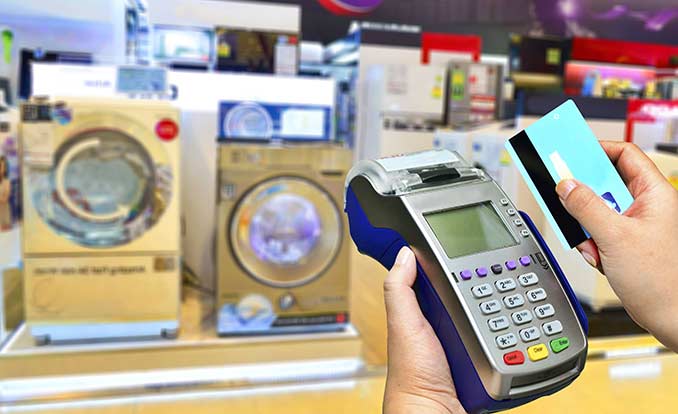
 High Ticket Merchant Accounts
High Ticket Merchant AccountsHigh average ticket sizes? High monthly volume? No problem. Integrate a payment solution designed to save you money.
One of the considerations for a merchant service provider while screening a merchant account applicant is average ticket size. It’s naturally higher for some retailers than others, and consequently carries a higher level of financial risk. Some industries with high average tickets are:
Transparency is a priority for high ticket businesses to remain viable. When you’re applying for a merchant account, it’s important to be up front about your average ticket sizes and monthly volume so that the provider can set up your merchant account with the appropriate scope. If you underestimate your ticket sizes and volume in an effort to get lower rates, and then exceed the limitations placed on your account, your provider is put in the position of having to hold funds or even close the account when suspicious ticket sizes or volumes come in.

Another priority is to be transparent with customers. When customers invest in a high ticket purchase, they are more likely to dispute it for even small reasons—the greater the price, the greater quality and value they expect. Therefore it’s important for high ticket merchants to manage customer expectation by providing honest, clear product or service descriptions, emphasizing quality control, and having a system in place to handle returns.
If you charge customers on a recurring billing plan, the terms and conditions of that plan must be clearly disclosed and agreed to by the customer. The alternative to any of these scenarios is getting credit card sales charged back by disgruntled buyers.
Merchant service providers care about chargebacks and fraud because they’re second in line to pay back the financial damages if the merchant is unable to. A chargeback for thousands of dollars is a large hit to a merchant account provider, who usually charges fittingly high transaction rates to create a way to absorb it if the merchant can’t pay. BankCard USA takes a more proactive approach by mitigating chargeback risks up front in order to minimize your rates. In fact, we offer a low rate guarantee to ensure you’re getting the lowest processing rates of any verified provider.
Learn more about chargebacks and ways to reduce your vulnerability to them here.
By the same token, fraud risk for high ticket merchants and their merchant account providers is amplified because there’s more money on the line. One fraudulent transaction for a high ticket merchant could be the equivalent of 100 fraudulent transactions for a small ticket merchant. We guide merchants through the proper ways to safeguard their businesses from fraud and drill down to the specific nuances of their business to find unique weaknesses, and seal them, before it occurs. Our PCI compliance team is also here to walk you through the annual self-assessment questionnaire and vulnerability scanning (for ecommerce and IP-connected terminal merchants) so that your business is shielded form avoidable fraud.
If you don’t yet accept credit card payments, starting to is a worthy consideration because of the many benefits they offer. People spend more than they might with cash, are more likely to pay on time, prefer using them, and if they don’t pay their card debt, it falls on the banks, not your business. Accepting them broadens your customer base, especially online, and quickly pays off the cost of setting up a merchant account. When you establish a credit card processing solution at your business, you’re also able to easily accept electronic checks, which come with their own set of benefits.
Are you a high-ticket merchant still accepting paper checks? When you integrate a credit card processing solution, you also gain access to echeck processing—which is less expensive because it involves the Automated Clearing House rather than credit card networks, and the real-time authorization process is taken out of the equation.

When a card-issuing bank authorizes a debit or credit card transaction, the bank assumes liability for providing funds for the transaction and usually places daily spending limits on debit and credit cards as a result. eCheck payments, on the other hand, are the sole responsibility of the check writer. They are only restricted by the amount of funds in the individual’s bank, making them popular for large consumer payments, such as mortgages, loans and rent, as well as business-to-business transactions.
Card payments are processed in real time and instantaneously deducted from a cardholder’s account. eChecks are processed after a transaction is made and take a period of time to clear, usually one to four business days depending on the size and source of the transaction. Property managers collecting rent and online service providers are common examples of echecks in action. Businesses often employ a service called Instant Account Verification (IAV) for online bank account payments in lieu of real-time authorization. IAV validates the bank credentials to ensure an account are real before accepting a payment.
Offering an echeck option in addition to card payments allows a business to broaden its customer base, especially online. All the customer needs is a bank account to make a payment, rather than a debit or credit card. Electronic payment processing solutions come with a plethora of capabilities and features that can help streamline your operations, reduce your administrative task load, and help your business grow.
We accept startups and existing businesses, with credit ranging from none or poor to great. We offer free consultations to show you exactly what you can save with a side-by-side comparison of your current processing statement with our proposal. If you don’t yet have a merchant account, we can offer honest advice about setting one up. With a specialized high ticket merchant account from BankCard USA, you don’t have to settle for exorbitant rates cutting into your profit margins, slow funding and the hidden fees so commonly exploited by other merchant service providers. Grow your business today.